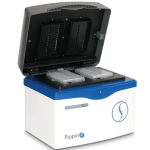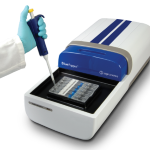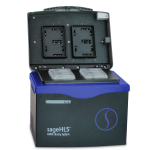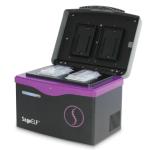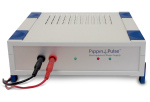CTCF-Mediated Human 3D Genome Architecture Reveals Chromatin Topology for Transcription
December 2015
Authors:
Zhonghui Tang, Oscar Junhong Luo, Xingwang Li, et al.
Info:
Scientists from the Jackson Lab and many collaborating institutes used the ChIA-PET strategy with other data sets to understand how genome organization affects transcription in human cells. They analyzed gene expression with the Iso-Seq method on a PacBio system, using SageELF for size selection.
Citation:
Cell 163, 1611–1627
DOI: 10.1016/j.cell.2015.11.024
Population genomics of intrapatient HIV-1 evolution
December 2015
Authors:
Fabio Zanini, Johanna Brodin, Lina Thebo, Christa Lanz, Göran Bratt, Jan Albert, and Richard Neher
Info:
Researchers from Germany and Sweden sequenced several samples collected over time from each of nine patients with HIV-1 to assess genetic diversity and minor variants of the virus as it evolved. Sequencing was performed on an Illumina MiSeq, with size selection of the Nextera library conducted with BluePippin.
Citation:
eLife 2015;4:e11282
http://dx.doi.org/10.7554/eLife.11282
MicroRNAs in the oriental fruit fly, Bactrocera dorsalis: extending Drosophilid miRNA conservation to the Tephritidae
October 2015
Authors:
Bernarda Calla and Scott M. Geib
Info:
Scientists analyzed small RNAs in Bactrocera dorsalis, the oriental fruit fly, and compared the resulting gene expression profile with that of Drosophila melanogaster. BluePippin was used to enrich for cDNAs between 92 bp and 118 bp prior to sequencing on an Ion Torrent PGM.
Citation:
BMC Genomics 2015 16:740
DOI: 10.1186/s12864-015-1835-3
Scarless genome editing and stable inducible expression vectors for Geobacter sulfurreducens
August 2015
Authors:
Chi Ho Chan, Caleb E. Levar, Lori Zacharoff, Jonathan P. Badalamenti, Daniel R. Bond
Info:
Scientists from the University of Minnesota report in Applied and Environmental Microbiology the development of genetic system improvements for Geobacter sulfurreducens. BluePippin was used to size-select libraries prior to sequencing on PacBio.
Citation:
doi:10.1128/AEM.01967-15
A multidrug resistance plasmid contains the molecular switch for type VI secretion in Acinetobacter baumannii
July 2015
Authors:
Brent S. Weber, Pek Man Ly, Joshua N. Irwin, Stefan Pukatzki, Mario F. Feldman
Info:
Scientists from the University of Alberta and Washington University published results in PNAS showing that a large plasmid is important to Acinetobacter baumannii’s ability to resist antibiotic treatment. The team prepared 20 Kb libraries for PacBio sequencing, using BluePippin for size selection.
Citation:
PNAS vol. 112 no. 309442-9447
doi:10.1073/pnas.1502966112
